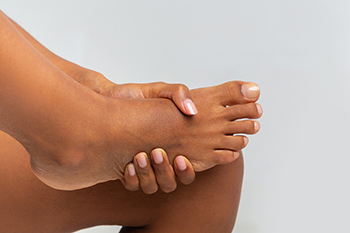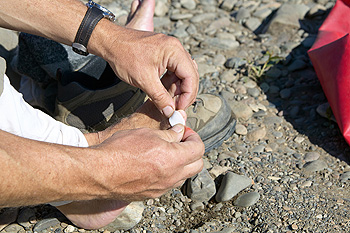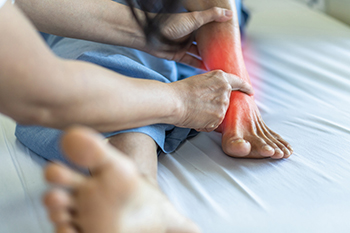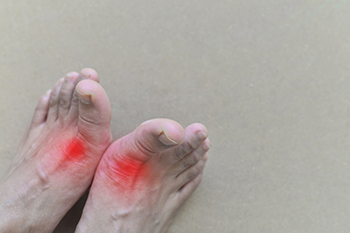Items filtered by date: December 2023
Warning Signs From Your Feet

The condition of your feet can offer valuable insights into your overall health. For instance, if your feet are persistently cold, it may signal hypothyroidism, a condition that slows your metabolism. Yellow toenails may be a sign of lymphedema or respiratory issues. Persistent yellowing warrants a visit to a podiatrist for a diagnosis and treatment options. Painful foot cramps can result from dehydration or nutrient deficiencies. It is a good idea to stay hydrated, maintain a balanced diet, and consider drinking low-calorie sports drinks with electrolytes to prevent and relieve foot cramps. An enlarged, painful big toe may indicate gout. This is a form of arthritis that often affects the big toe. It results from an overabundance of purines in the system and can cause flare ups of extreme pain, swelling, and redness in the big toe. Reducing the risk of gout involves moderating alcohol intake and avoiding red meat and seafood consumption. If you are experiencing unusual types of foot problems, or suspect you may have gout, it is suggested that you make an appointment with a podiatrist for a full diagnosis and treatment options.
Everyday foot care is very important to prevent infection and other foot ailments. If you need your feet checked, contact one of our podiatrists from Pocono Foot & Ankle Consultants. our doctors can provide the care you need to keep you pain-free and on your feet.
Everyday Foot Care
Often, people take care of their bodies, face and hair more so than they do for their feet. But the feet are a very important aspect of our bodies, and one that we should pay more attention to. Without our feet, we would not be able to perform most daily tasks.
It is best to check your feet regularly to make sure there are no new bruises or cuts that you may not have noticed before. For dry feet, moisturizer can easily be a remedy and can be applied as often as necessary to the affected areas. Wearing shoes that fit well can also help you maintain good foot health, as well as making it easier to walk and do daily activities without the stress or pain of ill-fitting shoes, high heels, or even flip flops. Wearing clean socks with closed shoes is important to ensure that sweat and bacteria do not accumulate within the shoe. Clean socks help to prevent Athlete’s foot, fungi problems, bad odors, and can absorb sweat.
If you have any questions please feel free to contact our offices located in Stroudsburg, Nazareth, and Easton, PA . We offer the newest diagnostic and treatment technologies for all your foot and ankle needs.
Managing Blisters While Hiking

Even with meticulous precautions, blisters can still sneak up on hikers. Experts suggest that staying vigilant and addressing potential issues promptly can prevent a minor discomfort from escalating into major problems. During your hike, take regular breaks, especially on extended treks spanning multiple days. Use these pauses to inspect your feet, allowing them to breathe and dry. If your socks become saturated, having a spare pair on hand for a quick change is a smart move. Even when it is raining, try to seize opportunities in dry areas to manage foot moisture effectively. If you sense the onset of irritation, stop and address it immediately. Even a minor discomfort can evolve into a painful issue. Pay attention to hot spots or nagging areas, taking proactive steps to remedy them. Waiting until the next planned stop may allow the problem to worsen significantly. In the unfortunate event of a blister forming, act promptly to avoid aggravating the situation. Halt your hike as soon as possible. Find a comfortable spot, sit down, and remove your boots. Address the blister with appropriate care, minimizing the risk of worsening the condition. By taking strategic breaks, promptly addressing irritations, and swiftly treating emerging blisters, hikers can maintain comfort and stride confidently along the trail. If you have developed a blister that has broken open and become infected, it is suggested that you schedule an appointment with a podiatrist for advanced treatment.
Blisters are prone to making everyday activities extremely uncomfortable. If your feet are hurting, contact one of our podiatrists of Pocono Foot & Ankle Consultants. our doctors can provide the care you need to keep you pain-free and on your feet.
Foot Blisters
Foot blisters develop as a result of constantly wearing tight or ill-fitting footwear. This happens due to the constant rubbing from the shoe, which can often lead to pain.
What Are Foot Blisters?
A foot blister is a small fluid-filled pocket that forms on the upper-most layer of the skin. Blisters are filled with clear fluid and can lead to blood drainage or pus if the area becomes infected.
How Do Blisters Form?
Blisters on the feet are often the result of constant friction of skin and material, usually by shoe rubbing. Walking in sandals, boots, or shoes that don’t fit properly for long periods of time can result in a blister. Having consistent foot moisture and humidity can easily lead to blister formation.
Prevention & Treatment
It is important to properly care for the affected area in order to prevent infection and ease the pain. Do not lance the blister and use a Band-Aid to provide pain relief. Also, be sure to keep your feet dry and wear proper fitting shoes. If you see blood or pus in a blister, seek assistance from a podiatrist.
If you have any questions, please feel free to contact our offices located in Stroudsburg, Nazareth, and Easton, PA . We offer the newest diagnostic and treatment technologies for all your foot care needs.
Risk Factors of Tarsal Tunnel Syndrome

Tarsal tunnel syndrome is a condition characterized by the compression of the tibial nerve as it passes through the tarsal tunnel in the ankle. Several factors can increase the risk of developing this syndrome. Some individuals may have foot structures that predispose them to tarsal tunnel syndrome. This includes flat feet or high arches, which can create abnormal pressure on the tibial nerve within the tarsal tunnel. Previous ankle injuries, fractures, or sprains can damage the structures within the tarsal tunnel, potentially leading to compression of the tibial nerve. Underlying medical conditions, such as diabetes, arthritis, or peripheral neuropathy, can increase the risk of nerve compression within the tarsal tunnel. Engaging in activities that involve repetitive foot movements or prolonged standing can strain the tibial nerve, raising the risk of tarsal tunnel syndrome. Wearing improperly fitting shoes or those lacking proper support can contribute to nerve compression in the tarsal tunnel. Excess body weight can exert added pressure on the foot and ankle, potentially compressing the tibial nerve. If you suffer from pain, numbness, or tingling in your ankle, it is suggested that you schedule an appointment with a podiatrist for a proper diagnosis and treatment.
Tarsal tunnel syndrome can be very uncomfortable to live with. If you are experiencing tarsal tunnel syndrome, contact one of our podiatrists of Pocono Foot & Ankle Consultants. our doctors can provide the care you need to keep you pain-free and on your feet.
Tarsal Tunnel Syndrome
Tarsal tunnel syndrome, which can also be called tibial nerve dysfunction, is an uncommon condition of misfiring peripheral nerves in the foot. The tibial nerve is the peripheral nerve in the leg responsible for sensation and movement of the foot and calf muscles. In tarsal tunnel syndrome, the tibial nerve is damaged, causing problems with movement and feeling in the foot of the affected leg.
Common Cause of Tarsal Tunnel Syndrome
- Involves pressure or an injury, direct pressure on the tibial nerve for an extended period of time, sometimes caused by other body structures close by or near the knee.
- Diseases that damage nerves, including diabetes, may cause tarsal tunnel syndrome.
- At times, tarsal tunnel syndrome can appear without an obvious cause in some cases.
The Effects of Tarsal Tunnel Syndrome
- Different sensations, an afflicted person may experience pain, tingling, burning or other unusual sensations in the foot of the affected leg.
- The foot muscles, toes and ankle become weaker, and curling your toes or flexing your foot can become difficult.
- If condition worsens, infections and ulcers may develop on the foot that is experiencing the syndrome.
A physical exam of the leg can help identify the presence of tarsal tunnel syndrome. Medical tests, such as a nerve biopsy, are also used to diagnose the condition. Patients may receive physical therapy and prescriptive medication. In extreme cases, some may require surgery.
If you have any questions please feel free to contact our offices located in Stroudsburg, Nazareth, and Easton, PA . We offer the newest diagnostic and treatment technologies for all your foot and ankle needs.
What Can Cause Gout?

Gout, a form of arthritis, manifests when urate crystals accumulate in the joints, causing intense pain and inflammation. While anyone can develop gout, certain factors increase susceptibility. Men, particularly those over 40 years old, are more prone, as are postmenopausal women. A family history of gout raises the risk, indicating a genetic predisposition. Lifestyle choices also play a pivotal role, and a diet rich in purines found in red meat, seafood, and alcohol can contribute to elevated uric acid levels. Obesity and medical conditions such as high blood pressure or diabetes amplify the likelihood of gout. Dehydration and certain medications may also tip the balance towards crystal formation in joints. The intricacies of gout's causes underscore the importance of proactive measures, including dietary adjustments, hydration, and lifestyle modifications. By understanding the factors and vulnerabilities associated with gout, individuals can take informed steps towards prevention and better management of this often painful condition. If you have developed gout, it is strongly suggested that you contact a podiatrist who can guide you toward effective management and pain relief techniques.
Gout is a foot condition that requires certain treatment and care. If you are seeking treatment, contact one of our podiatrists from Pocono Foot & Ankle Consultants. our doctors will treat your foot and ankle needs.
What Is Gout?
Gout is a type of arthritis caused by a buildup of uric acid in the bloodstream. It often develops in the foot, especially the big toe area, although it can manifest in other parts of the body as well. Gout can make walking and standing very painful and is especially common in diabetics and the obese.
People typically get gout because of a poor diet. Genetic predisposition is also a factor. The children of parents who have had gout frequently have a chance of developing it themselves.
Gout can easily be identified by redness and inflammation of the big toe and the surrounding areas of the foot. Other symptoms include extreme fatigue, joint pain, and running high fevers. Sometimes corticosteroid drugs can be prescribed to treat gout, but the best way to combat this disease is to get more exercise and eat a better diet.
If you have any questions please feel free to contact our offices located in Stroudsburg, Nazareth, and Easton, PA . We offer the newest diagnostic and treatment technologies for all your foot and ankle needs.




